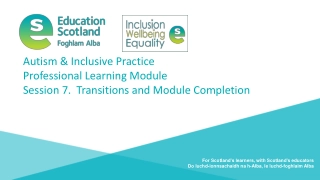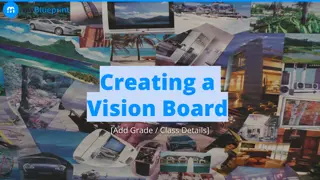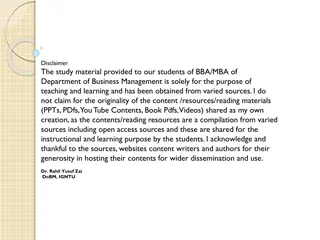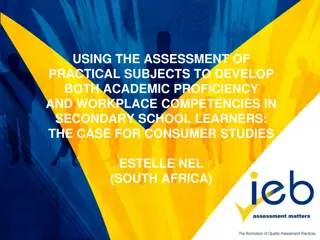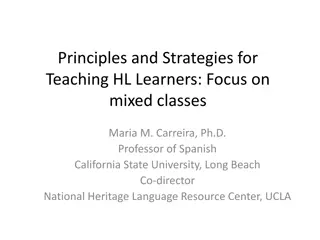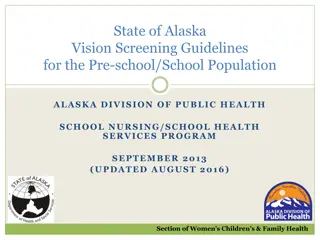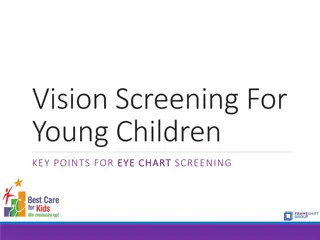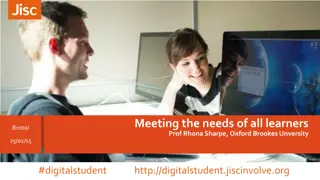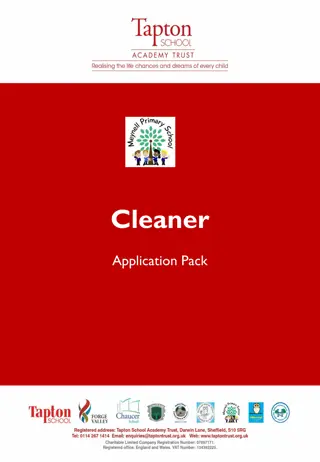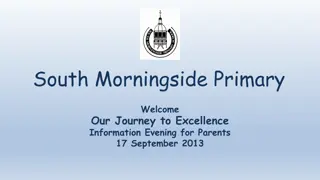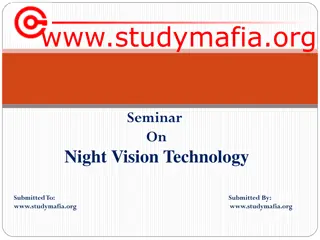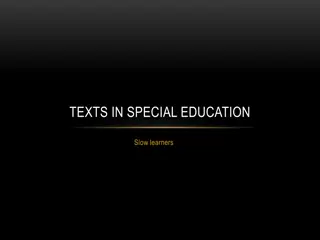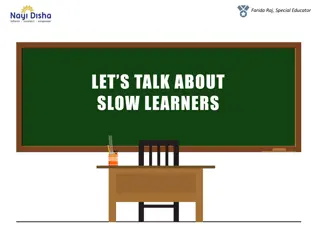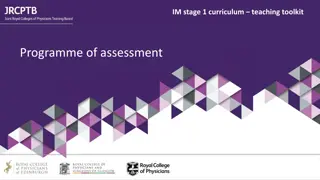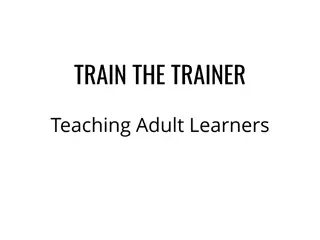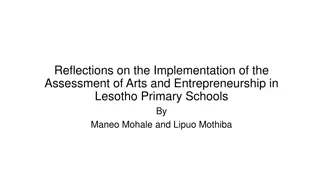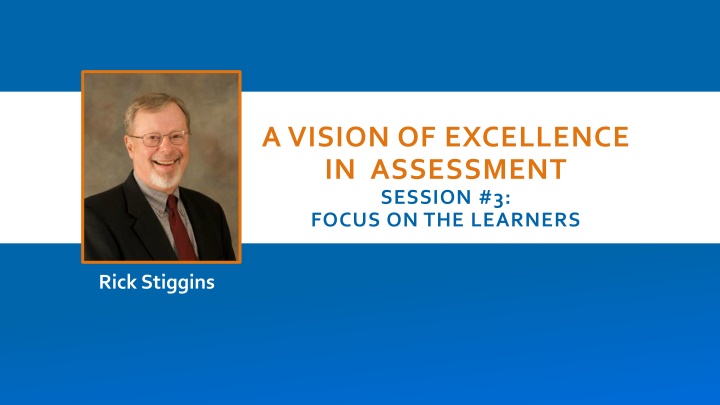
Focus on Learners in Assessment: A Vision of Excellence
Dive into a comprehensive session series by Rick Stiggins focusing on learners in assessment. Explore key elements such as student involvement, information needs, setting learning targets, self-assessment, feedback, and more. Discover the importance of student perspective in assessment success and empowering learners to continue their educational journey.
Download Presentation

Please find below an Image/Link to download the presentation.
The content on the website is provided AS IS for your information and personal use only. It may not be sold, licensed, or shared on other websites without obtaining consent from the author. If you encounter any issues during the download, it is possible that the publisher has removed the file from their server.
You are allowed to download the files provided on this website for personal or commercial use, subject to the condition that they are used lawfully. All files are the property of their respective owners.
The content on the website is provided AS IS for your information and personal use only. It may not be sold, licensed, or shared on other websites without obtaining consent from the author.
E N D
Presentation Transcript
A VISION OF EXCELLENCE IN ASSESSMENT SESSION #3: FOCUS ON THE LEARNERS Rick Stiggins
Session 1: Balanced Local Assessment Systems AN INTERACTIVE Session 2: Foundation of Assessment Literacy WORKSHOP IN Session 3: Emotional Dynamics of Assessment FOUR PARTS Session 4: Evaluate Your Assessment System rickstiggins@gmail.com www.MichiganAssessmentConsortium.org 2
All webinar recordings and related handouts can be found at www.michiganassessment consortium.org/events/Stiggins- webinars AN INTERACTIVE WORKSHOP IN FOUR PARTS rickstiggins@gmail.com www.MichiganAssessmentConsortium.org 3
ACCURACY EFFECTIVE USE PRE-PANDEMIC ASSIGNMENTS: EFFECTIVE COMMUNICATION PURPOSE DESIGN STUDENT MOTIVATION TARGET rickstiggins@gmail.com www.MichiganAssessmentConsortium.org 4
Key 1:Are students information needs planned for and met as they are learning? Key 2: Do students have a clear vision of the intended learning target(s) from the start? Key 3: Are students able to self-assess and set goals based on their assessment results? Key 4: Do students receive and offer effective feedback during the learning? Key 5: Do students track, reflect on, and share their learning progress? KEY : STUDENT INVOLVEMENT rickstiggins@gmail.com www.MichiganAssessmentConsortium.org 5
Always leave the learner willing and able to continue learning KEY TO ASSESSMENT SUCCESS #5 Help learners believe success is within reach if they keep trying rickstiggins@gmail.com www.MichiganAssessmentConsortium.org 6
What STUDENTS think about and do with assessment results is as important as what adults think about and do with them. ESSENTIAL NEW BELIEF rickstiggins@gmail.com www.MichiganAssessmentConsortium.org 7
STUDENTS DECIDE: Can I learn this or am I just too slow, dense stupid? Is the learning worth the energy I must expend to attain it? Is trying to learn worth the risk that I might fail again in public? rickstiggins@gmail.com www.MichiganAssessmentConsortium.org 8
A STUDENTS emotional reaction to results will determine what that student does in response. 9 rickstiggins@gmail.com www.MichiganAssessmentConsortium.org
PRODUCTIVE RESPONSE TO ASSESSMENT RESULTS: I understand these results. I know what I need to do next. I ve go this. I choose to keep trying. rickstiggins@gmail.com www.MichiganAssessmentConsortium.org 10
THE COUNTERPRODUCTIVEOR HOPELESS RESPONSE : I don t understand. I have no idea what to do next. I m no good at this stuff anyway. I quit. rickstiggins@gmail.com www.MichiganAssessmentConsortium.org 11
What STUDENTS think about and do with assessment results is as important as what adults think about and do with them. 12 rickstiggins@gmail.com www.MichiganAssessmentConsortium.org
Students are evidence-based instructional decision makers too, and they make their decisions FIRST! 13 rickstiggins@gmail.com www.MichiganAssessmentConsortium.org
Bandura says A strong sense of efficacy enhances human accomplishment and personal well-being in many ways. People with high assurance in their capabilities approach difficult tasks as challenges to be mastered rather than as threats to be avoided. Such an efficacious outlook fosters intrinsic interest and deep engrossment in activities. . 14 rickstiggins@gmail.com www.MichiganAssessmentConsortium.org
Bandura says They set themselves challenging goals and maintain strong commitment to them. They heighten and sustain their efforts in the face of failure. They quickly recover their sense of efficacy after failures or setbacks. They attribute failure to insufficient effort or deficient knowledge and skills which are acquirable . 15 rickstiggins@gmail.com www.MichiganAssessmentConsortium.org
Bandura says They approach threatening situations with assurance that they can exercise control over them. Such an efficacious outlook produces personal accomplishments, reduces stress, and lowers vulnerability. In contrast, people who doubt their capabilities shy away from difficult tasks which they view as personal threats. 16 rickstiggins@gmail.com www.MichiganAssessmentConsortium.org
Bandura says They have low aspirations and weak commitment to the goals they choose to pursue.. When faced with difficult tasks, they dwell on their personal deficiencies, on the obstacles they will encounter, and all kinds of adverse outcomes rather than concentrate on how to perform successfully. They slacken their efforts and give up quickly in the face of difficulties. 17 rickstiggins@gmail.com www.MichiganAssessmentConsortium.org
Bandura says They are slow to recover their sense of efficacy following failure or setbacks. Because they view performance as deficient aptitude it does not require much failure for them to lose faith in their capabilities. (Bandura, 1994, p. 71, emphasis added) 18 rickstiggins@gmail.com www.MichiganAssessmentConsortium.org
Can we help them make decisions that will lead to productive learning? Yes, we can with principles of ASSESSMENT FOR LEARNING 19 rickstiggins@gmail.com www.MichiganAssessmentConsortium.org
ASSESSMENT FOR LEARNING Formative assessment practices that include students as crucial assessment user/decision-makers in collaboration with their teachers rickstiggins@gmail.com www.MichiganAssessmentConsortium.org 20
Where am I going? 1. Provide a clear statement of the learning target 2. Use examples and models ATI Where am I now? 3. Offer regular descriptive feedback 4. Teach students to self-assess and set goals ASSESSMENT FOR LEARNING STRATEGIES: How can I close the gap? 5. Design focused lessons 6. Teach students focused revision 7. Engage students in self-reflection; let them keep track of and share their learning (Chappuis, 2017) rickstiggins@gmail.com www.MichiganAssessmentConsortium.org 21
Knowing where Im headed gives me a point of reference From which to understand feedback about where I am now So I can self-assess and watch myself grow And develop a vocabulary to talk with others about it. This helps me become confident of my success. As we close the gap I can participate in planning what comes next And feel in control of my success While communicating with others about my growth and upcoming needs. Think of 7 strategies as a progression: 22 rickstiggins@gmail.com www.MichiganAssessmentConsortium.org
Use work time more effectively Are more efficient problem solvers Show more persistence Work harder Evaluate their progress more frequently Use self-regulator strategies that promote success Those with confident sense of academic capability (self-efficacy): (Schunk & Pajares, 2005) 23 rickstiggins@gmail.com www.MichiganAssessmentConsortium.org
We must assess accurately, and use results effectively to make sure STUDENTS react productively to assessment results. ESSENTIAL NEW BELIEF rickstiggins@gmail.com www.MichiganAssessmentConsortium.org 24
What teachers and leaders need to know, understand, believe and do How to deliver those professional learnings in very effective ways What will happen to student learning if they bring them into play WE KNOW AND UNDERSTAND: All that has been missing is opportunity for them to learn. rickstiggins@gmail.com www.MichiganAssessmentConsortium.org 25
We have it within our power to give our students the gift of confidence. 26 rickstiggins@gmail.com www.MichiganAssessmentConsortium.org
Rather than merely ranking students and letting them fall into their destiny, let s give them the learning power to take control of their own destiny. 27 rickstiggins@gmail.com www.MichiganAssessmentConsortium.org
FOR MORE INFORMATION This webinar series is presented by the Michigan Assessment Consortium in collaboration with Rick Stiggins. Contact Rick Stiggins at rickstiggins@gmail.com with questions or feedback about this webinar series. Visit www.MichiganAssessmentConsortium.org for more information about balanced assessment systems and for opportunities to improve assessment literacy for yourself or in your professional community. rickstiggins@gmail.com www.MichiganAssessmentConsortium.org 28
ABOUT THIS SERIES This work is licensed under a Creative Commons Attribution-NonCommercial 4.0 International License. We invite you to share this series of four interactive webinars, in which Rick Stiggins addresses fundamental concepts needed by all educators who aspire to implementing high quality assessment practice designed to advance student learning. Appropriate for: teachers, principals, instructional coaches, central office administrators, superintendents, and others Webinars in this series include: Session 1: Balanced Local Assessment Systems Session 2: Foundation of Assessment Literacy Session 3: Emotional Dynamics of Assessment (this webinar) Session 4: Evaluate Your Assessment System All webinars and interactive handouts are available at www.michiganassessmentconsortium.org/events/Stiggins-webinars rickstiggins@gmail.com www.MichiganAssessmentConsortium.org 29

